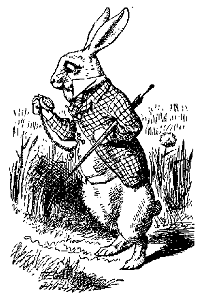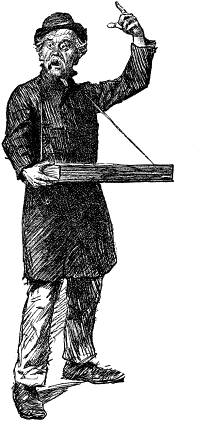|
Issue of July 5, 2006 Page Three |
 |
|
Issue of July 5, 2006 Page Three |
 |
|
Indubitably. Dear Word Detective: There was a word that I absolutely loved. It was a block long and the definition was "the use of big words." I swore I would remember it and use it at the appropriate time. Maybe it is a commentary on my circle of friends that the opportunity to use it has never come up. It is now gone. I would appreciate your help so that I can avoid starting in the "A's" and working my way through the dictionary. -- Michael Donohue.  I feel your pain, but I'd advise against that method, because the word you're looking for is well towards the back of the dictionary. Incidentally, every time I'm looking for something, there always seems to be some clown nearby who helpfully (and often quite smugly) announces that "It's always in the last place you look." Of course it is, because most normal people stop looking once they've found the thing. Meanwhile, back on track and for future reference, rather than plowing through the dictionary (as much fun as that can be), you might grab a copy of Word Menu (Stephen Glazer, Random House), a sort of reverse-lookup dictionary which classifies more than 75,000 words into almost 800 categories. But since I'm a nice guy (and that's not my book), I'll just answer the question. The word you're racking your noggin for is "sesquipedalian," which means "a long word" or, applied to people, "given to the use of long words." The root of "sesquipedalian" is the Latin "sequipedalis," meaning "foot and a half" (the Latin prefix "sesqui," meaning "and half again," plus "ped," foot), and the term was popularized by the Roman writer Horace, who wrote of "sesquipedalia verba" ("foot-and-a-half-long words") in his "Ars Poetica." The earliest use of "sesquipedalian" in English yet found was in the mid-17th century, and the word has also been used in the past to mean simply "very tall or big," as well as being applied to things literally one and one-half feet tall or long. "Sesquipedalian" has long been a favorite of word lovers and popular writers on language because of its self-referential zing, describing the use of long words with a long word, but I'd advise using it sparingly. Pundits, especially the pompous sort fond of bowties, also deploy "sesquipedalian" as often as they can, knowing full well that most of their audience will have to look it up, which makes the pundits, in my view, a fairly short word -- annoying.
And don't kowtow with your mouth full. Dear Word Detective: My son and I were laughing about the word "toadie" as used in the movie "A Christmas Story." A "toadie," I would assume, is like a "gofer" for a bully. We were wondering where the word came from. -- Linda Leondi.
I'm not sure where in the movie the word "toady" (as it's usually spelled) crops up, but since so much of the story revolves around rituals of childhood, especially bullying, it would actually be surprising if "toady" were not invoked at some point. A "toady" is more than just a "gofer" (one who "goes for," or runs errands) for a bully. The hallmark of a true toady is an attitude of subservience verging on worship. A toady is a fawning sycophant, a yes-man, a sidekick who actually seems to enjoy being kicked. As grim as the lot of the modern toady must seem, the original job description was much worse, as can be deduced from the fact that "toady" is actually a short form of the term "toad-eater." And yes, we're talking real toads. It all began back in the 1600s, when traveling patent-medicine quacks claimed to be able to cure all sorts of ailments, including poisoning, with their concoctions. At the time, toads were considered invariably poisonous (although few actually are), and most reasonable people shied from even touching, let alone eating, one. So a very effective sales technique was for the quack to have his assistant eat (or at least pretend to eat) a toad and, shortly thereafter, begin to display the symptoms of poisoning. A healthy helping of the quack's miracle potion, of course, soon made things right, and the rubes lined up to make the quack wealthy. The assistant was naturally known as "the toadeater" or "toady," and the term eventually came to mean a flunky who will do absolutely anything to curry favor with a superior.
Well, it seems that you have quite a lot. The Pullman car possibility that you mention probably requires a bit of explanation for some readers. George Pullman, a 19th century American inventor, developed the first successful and (comparatively) comfortable railroad sleeping car. A typical unit in a Pullman car, once rigged for sleep, consisted of a lower and an upper berth, separated from the aisle by a curtain. The upper berth, being more difficult to get into and out of, was considered less desirable and was, consequently, a bit cheaper, but not so cheap as to make a good metaphor for "broke." Incidentally, a good history of the railway sleeping car can be found here. Your hunch about shoes, however, was right on the money. The "upper" in "to be on one's uppers" is the part of the shoe above the sole, or, in US slang of the 1800s, the cloth gaiter or "spat" often worn above the shoe. "To walk on one's uppers," meaning to be down on one's luck, first appeared as US slang around 1886, probably first among actors ("The Royal Street actors who are walking on their uppers, must mourn ..when they ... hear of some of the boys spending 200 a week yachting," 1886). The image of one so poverty-stricken as to be walking nearly barefoot on badly worn soles was apparently powerful enough to make "on his uppers" a popular synonym for "stone broke" to this day.
Fortunately, the box doubles as a defibrillator.
Umm, pizza. Actually, these days, it's more often "Ugh, pizza," unfortunately. I recently saw a TV ad for some pizza with "the works," which in this case meant about nine varieties of meat topped with deep-fried onion rings (seriously) and piled on a crust stuffed with processed cheese goop. If you tried to sell that thing in certain parts of Brooklyn, you'd probably win a free swim in the Gowanus Canal. "Work" is one of those fine old English words that go all the way back to Indo-European, in this case to the root "worg," meaning "to work" or "to do." The same root, by the way, produced our modern English words "energy," "organ" and "orgy." Don't ask. Along the way, "work" as a noun picked up all sorts of meanings, from the job we do or the place where we do it ("I left my briefcase at work") to the product of our labors ("Stephen King's work betrays a morbid sensibility"). With the dawning of the age of machines, "work" was applied to both what machines did and the active parts of the gizmo that did the work. Thus, by the early 17th century, we spoke of the "works" of a complex machine (as in "My printer's works are clogged with cat fur"). This sense of "the works" being all the important parts of a machine produced, by the late 19th century, "the works" as slang for "everything" in phrases such as "give him the works" (meaning very rough treatment) and "tell the works" (reveal the whole story), as well as in more positive senses ("They gave him a company car, a free apartment, the works"). And it's this positive "hold nothing back" sense of "the works" that put those candied yams on your pizza.
|
All contents Copyright © 2006 by Evan Morris.